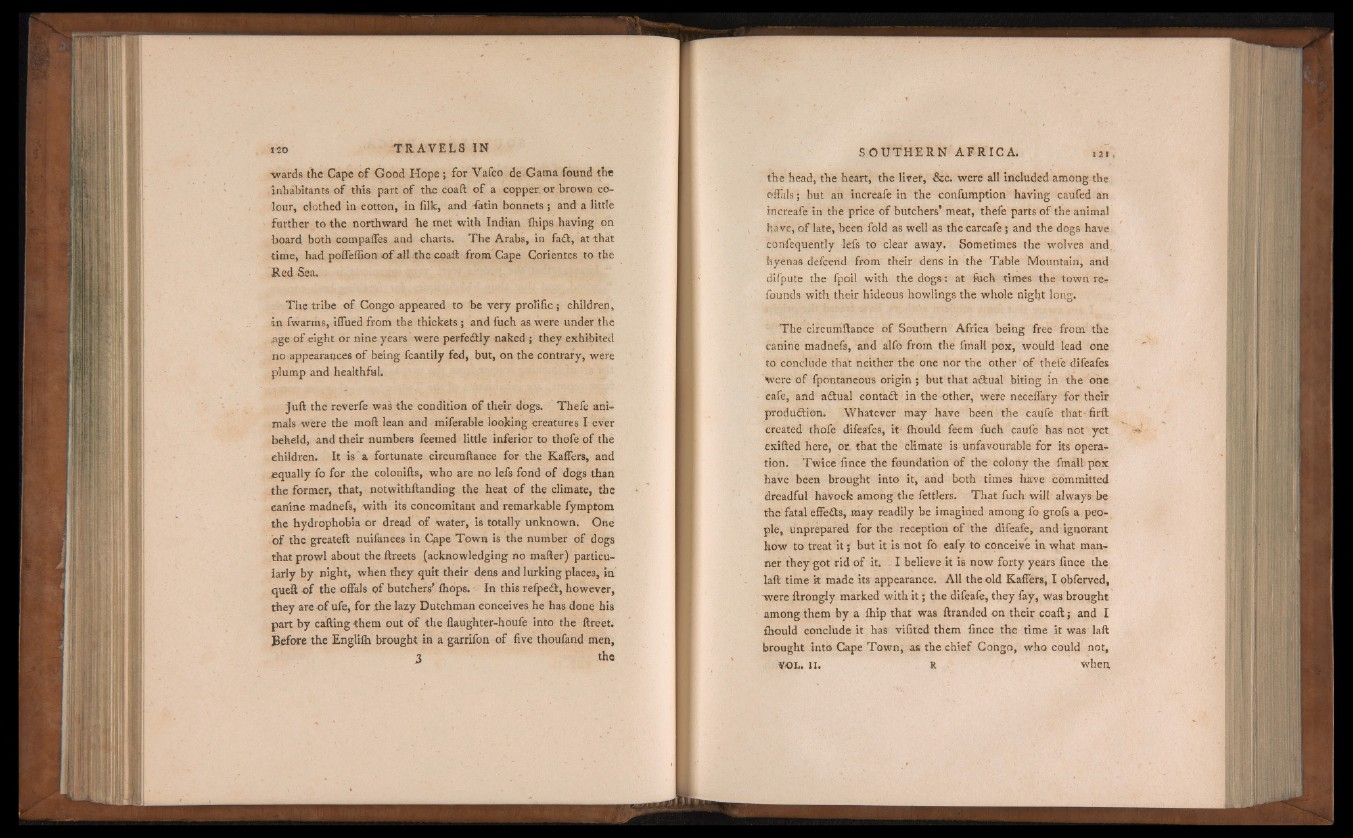
-wards the Cape of Good Hope ; for Vafco de Gama found the
inhabitants of this part of the coaft of a copper.or brown colour,
clothed in cotton, in filk, and fatin bonnets 5 and a little
further to the northward he met with Indian ihips having on
board both compaffes and charts. The Arabs, in fa£t, at that
time, had poffeffion o f all the coaft from Cape Corientes to the
Red Sea.
The tribe of Congo appeared to be very prolific j children,
in fwarms, iffued from the thickets ; and fuch as were under the
age of eight or nine years were perfectly naked ; they exhibited
no appearances of being fcantily fed, but, on the contrary, were
plump and healthful.
Juft the reverfe was the condition of their dogs. Thefe animals
were the moll lean and miferable looking creatures l ever
beheld, and their numbers feemed little inferior to thofe of the
ehildren. It is a fortunate circumftance for the Kaffers, and
equally fo for the colonifts, who are no lefs fond of dogs than
the former, that, notwithftanding the heat of the climate, the
canine madnefs, with its concomitant and remarkable fymptom
the hydrophobia or dread of water, is totally unknown. One
of the greateft nuifanees in Cape Town is the number of dogs
that prowl about the ftreets {acknowledging no mailer) particularly
by night, when they quit their dens and lurking places, in
quell -of the offals of butchers’ fliops. In this refpeCt, however,
they are of ufe, for the iazy Dutchman conceives he has done his
part by calling them out of the fiaughter-houfe into the ftreet.
Before the Englifti brought in a garrifon of five thoufand men,
3 the
the head, the heart, the livef, &c. were all included among the
offals ; but an increafe in the confumption having caufed an
increafe In the price of butchers’ meat, thefe parts of the animal
have, of late, been fold as well as the carcafe ; and the dogs have
confequently lefs to clear away. Sometimes the wolves and
hyenas defeend from their dens in the Table Mountain, and
difpute the fpoil with the dogs: at fuch times the town re-
founds with their hideous howlings the whole night long.
The circumftance of Southern Africa being free from the
canine madnefs, and alfo from the fmall pox, would lead one
to conclude that neither the one nor the other of thefe difeafes
Were of fpontaneous origin ; but that aftual biting in the one
cafe, and aCtual contact in the other, were neceflary for their
production. Whatever may have been the caqfe that-firft
created thofe difeafes, it Ihould feem fuch caufe has not yet
exifted here, or that the climate is unfavourable for its operation.
Twice fince the foundation of the colony the fmall pox
have been brought into it, and both times have committed
dreadful havock among the fettlers. That fuch will always be
the fatal effects, may readily be imagined among fo grofs a people,
unprepared for the reception of the difeafe, and ignorant
how to treat i t ; but it is not fo eafy to conceive in what manner
they got rid of it. I believe it is now forty years fince the
laft time it made its appearance. All the old Kaffers, I obferved,
were ftrongly marked with it ; the difeafe, they fay, was brought
among them by a ihip that was ftranded on thefe coaft; and I
ihould conclude it has vifited them fince the time it was laft
brought into Cape Town, as the chief Congo, who could not,
V-o l . n . R w h e n